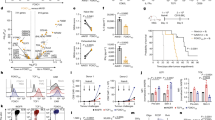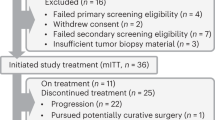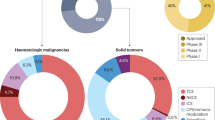Abstract
Anterior gradient-2 (AGR2) promotes tumor growth, cell migration and cellular transformation and its enhanced expression is almost completely restricted to malignant tissues, thus making AGR2 an interesting target for the development of immunotherapeutic strategies. We investigated whether the AGR2 molecule comprises human leukocyte antigen (HLA)-A*0201-binding epitopes recognized by human cytotoxic T lymphocytes (CTLs), which could be targeted in dendritic cell (DC)-based cancer immunotherapy against colorectal cancer (CRC). We reviewed the sequence of AGR2 for peptides that could potentially bind to HLA-A*0201 with the aid of a computer-based program. Five candidate peptides with different binding scores were synthesized and tested. These peptides were then assessed for their immunogenicity to elicit specific immune responses mediated by CTLs in vitro by means of enzyme-linked immunospot assays and CTL assays. AGR2 was highly expressed in several CRC cell lines, including DK01, DLD1, KM12C, HCT-8 and HT-29. DCs pulsed with AGR2-P2 (aa 11-19; LLVALSYTL) or AGR2-P4 (aa 127-135; RIMFVDPSL) generated potent CTLs that could lyse T2 cells pulsed with AGR2-P2 or AGR2-P4 and HLA-A0201+ AGR2-positive CRC cell lines in a strong dose-dependent and HLA-A*0201-restricted manner. In conclusion, these novel epitopes derived from AGR2 protein may be attractive candidates for DC-based immunotherapy for CRC.
This is a preview of subscription content, access via your institution
Access options
Subscribe to this journal
Receive 12 digital issues and online access to articles
$119.00 per year
only $9.92 per issue
Buy this article
- Purchase on Springer Link
- Instant access to full article PDF
Prices may be subject to local taxes which are calculated during checkout






Similar content being viewed by others
References
Aberger F, Weidinger G, Grunz H, Richter K . Anterior specification of embryonic ectoderm: the role of the Xenopus cement gland-specific gene XAG-2. Mech Dev 1998; 72: 115–130.
Thompson DA, Weigel RJ . hAG-2, the human homologue of the Xenopus laevis cement gland gene XAG-2, is coexpressed with estrogen receptor in breast cancer cell lines. Biochem Biophys Res Commun 1998; 251: 111–116.
Pohler E, Craig AL, Cotton J, Lawrie L, Dillon JF, Ross P et al. The Barrett's antigen anterior gradient-2 silences the p53 transcriptional response to DNA damage. Mol Cell Proteomics 2004; 3: 534–547.
Lowe AW, Olsen M, Hao Y, Lee SP, Taek Lee K, Chen X et al. Gene expression patterns in pancreatic tumors, cells and tissues. PLoS ONE 2007; 2: e323.
Iacobuzio-Donahue CA, Maitra A, Olsen M, Lowe AW, van Heek NT, Rosty C et al. Exploration of global gene expression patterns in pancreatic adenocarcinoma using cDNA microarrays. Am J Pathol 2003; 162: 1151–1162.
Fletcher GC, Patel S, Tyson K, Adam PJ, Schenker M, Loader JA et al. hAG-2 and hAG-3, human homologues of genes involved in differentiation, are associated with oestrogen receptor-positive breast tumours and interact with metastasis gene C4.4a and dystroglycan. Br J Cancer 2003; 88: 579–585.
Liu D, Rudland PS, Sibson DR, Platt-Higgins A, Barraclough R . Human homologue of cement gland protein, a novel metastasis inducer associated with breast carcinomas. Cancer Res 2005; 65: 3796–3805.
Mosolits S, Nilsson B, Mellstedt H . Towards therapeutic vaccines for colorectal carcinoma: a review of clinical trials. Expert Rev Vaccines 2005; 4: 329–350.
Banchereau J, Palucka AK . Dendritic cells as therapeutic vaccines against cancer. Nat Rev Immunol 2005; 5: 296–306.
Melief CJ, van der Burg SH, Toes RE, Ossendorp F, Offringa R . Effective therapeutic anticancer vaccines based on precision guiding of cytolytic T lymphocytes. Immunol Rev 2002; 188: 177–182.
Gilboa E . DC-based cancer vaccines. J Clin Invest 2007; 117: 1195–1203.
Nakamura M, Iwahashi M, Nakamori M, Ueda K, Ojima T, Naka T et al. Dendritic cells transduced with tumor-associated antigen gene elicit potent therapeutic antitumor immunity: comparison with immunodominant peptide-pulsed DCs. Oncology 2005; 68: 163–170.
Morse MA, Nair SK, Mosca PJ, Hobeika AC, Clay TM, Deng Y et al. Immunotherapy with autologous, human dendritic cells transfected with carcinoembryonic antigen mRNA. Cancer Invest 2003; 21: 341–349.
Correale P, Cusi MG, del Vecchio MT, Aquino A, Prete SP, Tsang KY et al. Dendritic cell-mediated cross-presentation of antigens derived from colon carcinoma cells exposed to a highly cytotoxic multidrug regimen with gemcitabine, oxaliplatin, 5-fluorouracil, and leucovorin, elicits a powerful human antigen-specific CTL response with antitumor activity in vitro. J Immunol 2005; 175: 820–828.
Marten A, Renoth S, Schmidt-Wolf IG . Increase of the stimulatory effect of dendritic cells by pulsing with apoptotic bodies transfected with the MHC class II gene. Mol Immunol 2002; 39: 395–398.
Massa C, Melani C, Colombo MP . Chaperon and adjuvant activity of hsp70: different natural killer requirement for cross-priming of chaperoned and bystander antigens. Cancer Res 2005; 65: 7942–7949.
Ohta K, Yamaguchi Y, Shimizu K, Miyahara E, Toge T . Novel system for generating cytotoxic effector lymphocytes using carcinoembryonic antigen (CEA) peptide and cultured dendritic cells. Anticancer Res 2002; 22: 2597–2606.
Matsuda K, Tsunoda T, Tanaka H, Umano Y, Tanimura H, Nukaya I et al. Enhancement of cytotoxic T-lymphocyte responses in patients with gastrointestinal malignancies following vaccination with CEA peptide-pulsed dendritic cells. Cancer Immunol Immunother 2004; 53: 609–616.
Koido S, Hara E, Homma S, Torii A, Toyama Y, Kawahara H et al. Dendritic cells fused with allogeneic colorectal cancer cell line present multiple colorectal cancer-specific antigens and induce antitumor immunity against autologous tumor cells. Clin Cancer Res 2005; 11: 7891–7900.
Muthuswamy R, Urban J, Lee JJ, Reinhart TA, Bartlett D, Kalinski P . Ability of mature dendritic cells to interact with regulatory T cells is imprinted during maturation. Cancer Res 2008; 68: 5972–5978.
Nijman HW, Houbiers JG, Vierboom MP, van der Burg SH, Drijfhout JW, D'Amaro J et al. Identification of peptide sequences that potentially trigger HLA-A2.1-restricted cytotoxic T lymphocytes. Eur J Immunol 1993; 23: 1215–1219.
Parish CR . Fluorescent dyes for lymphocyte migration and proliferation studies. Immunol Cell Biol 1999; 77: 499–508.
Yi Q, Bergenbrant S, Osterborg A, Osby E, Ostman R, Bjorkholm M et al. T-cell stimulation induced by idiotypes on monoclonal immunoglobulins in patients with monoclonal gammopathies. Scand J Immunol 1993; 38: 529–534.
Yi Q, Osterborg A, Bergenbrant S, Mellstedt H, Holm G, Lefvert AK . Idiotype-reactive T-cell subsets and tumor load in monoclonal gammopathies. Blood 1995; 86: 3043–3049.
Qian J, Wang S, Yang J, Xie J, Lin P, Freeman ME et al. Targeting heat shock proteins for immunotherapy in multiple myeloma: generation of myeloma-specific CTLs using dendritic cells pulsed with tumor-derived gp96. Clin Cancer Res 2005; 11: 8808–8815.
Okur FV, Brenner MK . Cellular immunotherapy of cancer. Methods Mol Biol 2010; 651: 319–345.
Brinkman JA, Fausch SC, Weber JS, Kast WM . Peptide-based vaccines for cancer immunotherapy. Expert Opin Biol Ther 2004; 4: 181–198.
Shen L, Rock KL . Cellular protein is the source of cross-priming antigen in vivo. Proc Natl Acad Sci USA 2004; 101: 3035–3040.
Wolkers MC, Brouwenstijn N, Bakker AH, Toebes M, Schumacher TN . Antigen bias in T cell cross-priming. Science 2004; 304: 1314–1317.
Acknowledgements
This study was financially supported by a grant of the Korea Healthcare technology R&D Project (No. A080489), Ministry of Health & Welfare; by General Researcher Program Type II (No. 2011-0005285) of the National Research Foundation of Korea; from the Regional Technology Innovation Program (No. RTI05-01-01) of the Ministry of Commerce, Industry and Energy; from the Regional Industrial Technology Development program (No. A000200058) of the Ministry of Knowledge and Economy; from the National R&D Program (No. 1120390) for Cancer Control, Ministry for Health and Welfare; and from Leading Foreign Research Institute Recruitment Program (No. 2011-0030034) through the National Research Foundation of Korea (NRF) funded by the Ministry of Education, Science and Technology (MEST), Korea.
Author information
Authors and Affiliations
Additional information
Supplementary information accompanies the paper on Cellular & Molecular Immunology's website.
Supplementary information
Rights and permissions
About this article
Cite this article
Ju Lee, H., Yi Hong, C., Jin, CJ. et al. Identification of novel HLA-A*0201-restricted epitopes from anterior gradient-2 as a tumor-associated antigen against colorectal cancer. Cell Mol Immunol 9, 175–183 (2012). https://doi.org/10.1038/cmi.2011.52
Received:
Revised:
Accepted:
Published:
Issue Date:
DOI: https://doi.org/10.1038/cmi.2011.52
Keywords
This article is cited by
-
Antigenic Potency of LY6E in Stimulating Dendritic Cells to Elicit Tumor-Specific Responses Against Human Colorectal and Gastric Cancer Cell Lines
International Journal of Peptide Research and Therapeutics (2021)



